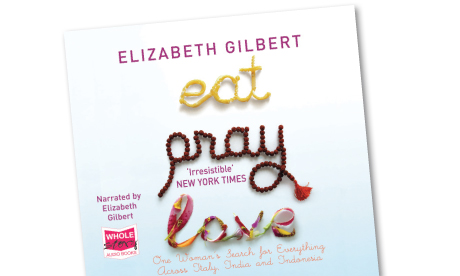
Don't miss a selection of self-help books that will make you think, not groan - free each day with the Guardian.
Oliver Burkeman, writer of This column will change your life, and author of HELP!: How to Become Slightly Happier and Get a Bit More Done, shares his view of the titles below.
Monday: Eat, Pray, Love
It ought to be emphasised that the critically non-acclaimed Julia Roberts movie version has relatively little direct connection to Elizabeth Gilbert's massive bestseller Eat, Pray, Love - an account of her post-divorce quest for personal transformation through romance, good food and spirituality. Gilbert's prose, talents and her knowingness — she's well aware her quest is self-indulgent — are what lift her memoir well above others in the finding-yourself genre.
Tuesday: Zen and the Art of Motorcycle Maintenance
Robert Pirsig's "philosophical novel" Zen And The Art of Motorcycle Maintenance was reportedly rejected by more than 120 publishers before becoming a dizzyingly successful cult title in the 1970s. In a story that doesn't have much to do with Zen (but a fair amount to do with motorcycle maintenance) Pirsig's nameless narrator recounts a multi-week motorbike journey through the American West with his son, pausing along the way to outline his mind-expanding if occasionally baffling personal philosophy: the "metaphysics of quality". His musings on how to reconcile "romantic" and "rational" views of life have an absorbingly trippy effect that's liable to make you suddenly feel as if you've grasped the meaning of existence, or, failing that, that you urgently need to go on a road-trip across the United States.
Wednesday: Sophie's World
Subtitled "a novel about the history of philosophy", Jostein Gaarder's Sophie's World owes something to Pirsig, though it's far less concerned with its author's personal outlook — instead, it's a fictional tour through Western philosophy from ancient Greece to the existentialists — and is aimed at a younger audience. Gaarder's storytelling device has the book's 14-year-old heroine receiving mysterious letters in the mail, outlining the major ideas of the western philosophical tradition. It's a bit odd as a fictional conceit, but an effective way of conveying a large number of complex and exciting ideas in a highly palatable form.
Thursday: The Power of Positive Thinking
2012 marks the sixtieth anniversary of The Power of Positive Thinking, the book by Norman Vincent Peale that (along with Dale Carnegie's How To Win Friends And Influence People) is arguably the progenitor of the modern genre of self-help. These days, its relentlessly bright, religion-tinged message is deeply controversial: the social critic Barbara Ehrenreich has argued that positive thinking was significantly to blame for the American subprime mortgage crisis, among other ills, and there's plenty of evidence to suggest that positive thinking is counterproductive. But as a historical document, it's fascinating, and crucial to understanding the origins of the modern-day "happiness industry".

